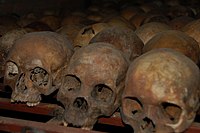
I stumbled across an incredibly moving program on CNN Saturday Night. Christiane Amanpour was hosting a show entitled "Genocide" -- a survey of the mass ethnic slaughters that have taken place since the term was invented in the mid-twentieth century. Although I missed the first half, I take it she began with Pol Pot and the killing fields of Cambodia --about which I know very little.
Then she surveyed: the Iraqi Kurds, Bosnia, Rwanda, and Darfur, and interviewed those brave individuals who tried to intervene and help, by "crying bloody murder." Several did this at great personal cost. And, as so often is the case, the failure of other powers to intervene led to the wholesale slaughter of not just men, but women, children, infants, and unborn children. The scenes are gut-wrenching in the extreme, but important.
The most affecting scene was the head of UN "forces" in Rwanda, a Canadian. Before the slaughter of the Tutsi broke out, this man had asked for 4,500 troops. He was granted 2,600, and a very limited mandate. As the slaughter began to unfold, his troop force was cut to 260. It became impossible even to rescue women and children from the long knives of the Hutu, and entire families were slaughtered, something on the order of 300,000 souls in a matter of a few weeks. The UN ordered the general to decamp --and he refused. The order, he said, was legal, but immoral. He was bowing to a higher law --the law of all that is just and good and right, no matter how hopeless the cause. He had gone to Rwanda with high hopes, and returned a crushed, bitter and broken spirit --not just because of the carnage he saw, but because the nations of the world had turned a blind eye to the mass slaughter.
The most moving story was of a Tutsi woman. When the carnage broke out, Hutus in her village with whom she had lived her entire life, turned on her family and killed her husband and 5 of her children. When Amanpour asked her how she could cope with such brutality, she said "I am a Christian, and I pray a lot." Then, it showed how she welcomed the murderer of her husband into her house, forgave him, and broke bread with him. She had started a business enterprise with the wife of her family's murderer. The murderer spent time in jail, and came back, and pled for forgiveness for his crimes, and she forgave him. Grace at work.
All of this carnage brought home to me in a new way just how desperate and dark the world is. We hide from it in the western world, where only occasional bad things happen. We might be the victim of a random crime, but even the events of 9-11 pale in comparison with the horror of these genocides. Some Christians would have us turn in and away from the horrors of the world --the church's kingdom is "spiritual," and it has nothing whatever to say about injustice and evil in the world. I think such a position is craven and cowardly in the extreme, cloaked as it may be under the cover of orthodoxy and spirituality.
That Christians may disagree on what is an appropriate response (military, humanitarian, or some mingling of the two), the wrong response is to do what so many of the Orthodox German Lutherans did at the rise of Hitlerism, which is to fold their hands, pray, and do nothing, or, worse, to support unthinkingly the powers that be.
Love the world, pray for the world, and plead the cause of the helpless, pester leaders to do the right thing, rabble rouse for those who cannot take up for themselves, be they the unborn here, or the children of Darfur.

